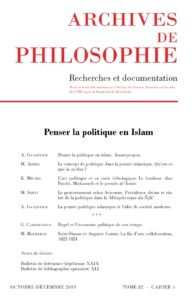 Volume 82, Issue 4, October-December 2019
Volume 82, Issue 4, October-December 2019
Thinking politics in Islam
 Anoush Ganjipour, Thinking politics in Islam. A Foreword
Anoush Ganjipour, Thinking politics in Islam. A Foreword
Makram Abbès, The concept of politics in Islamic thought. What is siyâsa?
This article explores the meaning of the word “siyâsa,” referring to politics in Arabic and in several languages of the Muslim world (Turkish, Persian, Urdu, etc.). Our aim is to restore its full semantic depth by treating it as a concept, according to R. Koselleck’s historical semantics. The work thus paves the way for the requalification of the word and its elevation to the rank of a major tool, helping us to better understand political thought and governance in the classical age of Islam (seventh–fifteenth centuries).
Karine Michel, The question of happiness in al-Fārābī, Miskawayh, and the pseudo-al-‘Āmirī
The present article interrogates the way in which Muslim thinkers of the classical period produced a political science that sought to be a practical art, with a teleological aim: happiness. Through the reflections of al-Farabi, Miskawayh, and the pseudo-al-‘Āmiri, we will show how a new political thought arose, taking roots in different fields: biology, noetics, and ethics. Since the human being is principally perceived by these thinkers as a composition of body and mind, the civil association seems to them a necessary condition for the achievement of happiness by man. This happiness is no longer only the ultimate one promised in the afterlife but a worldly happiness, hic et nunc.
Meryem Sebti , The government according to Avicenna. Divine providence and the status of politics in The Metaphysics of al-Shifa’
Avicenna’s conception of politics is inseparable from his doctrine of divine providence and prophecy. This work examines the implications of this doctrine through the study of the last book of Avicenna’s The Metaphysics of al-Shifa’, the philosopher’s most complete text on the ordering of the city, its laws, and the nature of the legislator. This study purports to answer the following question: since divine providence extends to the limits of the sensible world, including human society, through the mediation of the prophet and the revealed law, is there still room for a science such as politics, which seeks to lay the foundations of a properly human order?.
Anoush Ganjipour, Islamic political thought and the idea of modern society
If political thought was first born in Islamic tradition through the translation/appropriation of Greek political philosophy, we can arguably suppose that it undertook an analogous process in the nineteenth century when it encountered modern social and political thought. In an apparently paradoxical way, this new “translation movement” marked the initial moment of the modernization of Islam and its contemporary politicization. By focusing on this major turning-point in Islamic political thought, the present paper attempts to track the theoretical path through which Islamic reformists aimed to restructure Islam by conferring a new theological-political function onto Sharia law and, in so doing, to transform this religion into a “political religion,” i. e., a precisely modern religion.
* * *
Gilles Campagnolo, Hegel and political economy in his time
In Économie politique et philosophie chez Steuart et Hegel (1963), Paul Chamley examined Hegel’s interest in economics. Chamley stressed the influence on Hegel of reading Sir James Steuart’s An Inquiry into the Principles of Political Economy, a major work (too overlooked today) that preceded Adam Smith’s Wealth of Nations. Now, is there such a thing as “Hegelian economics?” If so, what are its themes and is it fully consistent, or should one consider, besides the influence of Steuart, that of a body of traditional German Cameralist writings as well as that of incipient British classicism? This essay reevaluates Hegelian views on economics with regard to the knowledge that Hegel drew from economics in his time.
Michel Bourdeau, Saint-Simon and Auguste Comte, the End of a Collaboration, 1822–1824
The question of the relationship between Comte and Saint-Simon is still unclear: Comte, who for seven years acted as secretary to Saint-Simon, was later very unfair to him. The first step toward a clarification is to settle some facts. This paper focuses on what happened between the two publications, in newspapers edited by Saint-Simon, of the Plan des travaux scientifiques nécessaires pour réorganiser la société (May 1822–May 1824), a crucial episode that ended with Comte breaking off definitively with Saint-Simon. Thanks to the new edition of the collected works of Saint-Simon, it is possible to uncover how Saint-Simon perceived the two men’s relationship.
